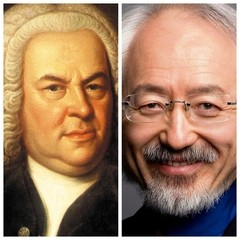|
Back
A Suzuki Yuletide With a Merry Crispness New York
Alice Tully Hall, Lincoln Center
12/06/2017 -
Johann Sebastian Bach: Four Cantatas from Weihnachtsoratorium, BWV 248: 1. Jauchzet frohlocket auf preiset die Tage, 2. Und es waren Hirten in derselben Gegend, 3. Herrscher des Himmels, erhöre das Lallen & 6. Herr, wenn die stolzen Feinde schnauben
Sherezade Panthaki (Soprano), Jay Carter (Countertenor), Zachary Wilder (Tenor), Dominik Wörner (Bass)
Bach Collegium Japan, Masaaki Suzuki (Conductor)

J. S.Bach/M. Suzuki (© Public domain/Marco Borggreve)
“Stimmet voll Jauchzen und Fröhlichkeit an!/Dienet dem Höchsten mit herrlichen Chören.” (“Sound forth with delight and gladness/Serve the Highest with glorious choruses.”)
From “Part One” of Christmas Oratorio, by Johann Sebastian Bach
Saying that Masaaki Suzuki resembles either Colonel Sanders or a slimmed-down Santa Claus would be either demeaning or disrespectful for, say a Passion or B Minor Mass. But Johann Bach’s Christmas Oratorio is such a jubilant work, overflowing with good cheer, amiable oxen, fragrant myrrh and gossipy shepherds dwelling in the fields that a jubilant metaphor is never out of place.
Masaaki Suzuki is one of the three conductors today who can turn “authentic-instrument” Bach into a rousing Christmas celebration. Comparing Mr. Suzuki’s wondrous band last night to Sir John Eliot Gardiner or Ton Koopman is a fool’s errand. We had Maestro Suzuki last night for a full house at Alice Tully Hall. So, while Messiah never loses its luster, his Bach Christmas Oratorio is always a worthy competitor.
Mr. Suzuki could have divided the six cantatas of the work into two evenings (the whole Oratorio lasts about three hours). Instead he gave us four of the cantatas, eliminating the Fouth and Fifth. Not only was that acceptable, but it actually improved on the original Bach, where each cantata was given on a separate Sunday service. (Though one must exclude the words, if not the music, of the last jingoistic war-song against “Devil, death, sin and hell”. And obviously Papists.)
Nor would the supposedly dour old organist have minded how it was offered. After all, much of the music came from plagiarizing his sometimes ribald secular oratorios. The opening chorus comes from a cantata celebrating the birth of a baby to some Empress. That most beautiful counter-tenor aria sung to Mary in the Second Cantata, Schlafe, mein Liebster, geniesse der Ruh (“Sleep my beloved, enjoy your rest”) was originally sung by Lecher to Hercules, “Taste my beautiful breast with no limits.”
Whether Bach called in his sons and laughed together with them about this little joke, we’ll never know. But the parody does give some idea of the exultation with which Bach was composing the works.
Maestro Suzuki has worked with nearly all the great international authentic-instrument ensembles of the world. Last night, though, his ensemble was his own Bach Collegium Japan, now over a quarter-century old. Obviously the soloists have changed, since they looked refreshingly young. But the conductor’s experience, dedication and most eloquent movements on the dais gave that mixture of élan and respect for the music.
Few could resist the opening (repeated at the end) of the three trumpet players. Hidenori Saito played the C Major “Bach” trumpet with great clarity, while the other valveless instruments joined in the chorus. Nor can one forget the simple but clarion-sounding pounding timpani here.
The other instruments all made a joyful noise unto the Lord here (obviously waking up Baby Jesus!). We had the simple oboes, and a wonderful angled “hunting oboe”. The flutes were soft but evocative (Kiyomi Suga’s flute with tenor Zachary Wilder in Frohe Hirten, eilt, ach eilet (“Happy Shepherds, Hurry Along”) was as nimble as the shepherds themselves could have been, hoping to get a glimpse of the Christ-child, while the solo violinist (I believe it was Natsumi Wakematsu) was strong and lyrical in her duet.
The main element, though, was the combination of these instruments, and Mr. Suzuki kept a good, if not perfect balance here. One of the advantages of hearing him live is that no recording editor had a change to equalize these sounds, to give a homogenous timbre to the music. Obviously we will never know exactly how Bach’s forces sounded, but obviously their flutes or oboes or strings might have stood out from their ensembles. This was certainly true here, and this made the personality rather than savorless perfection all the more engaging.
Mr. Suzuki’s choir was basically Bach size. The composer might have worked with 12 or 20 performers, so the Collegium Bach Japan 16 voices was probably right. Their balance was credible in the familiar chorales. But in the anthems with brass and kettledrum, the chorus was actually energetic. Not, say, with the energy of a Beethoven, but with Bach’s burning fervor, with a crispness (a merry crispeness?).
As in Bach’s time, the soloists were members of the choir, giving their recitatives (Zachary Wilder, the open beautifully enunciated Evangelist) or their arias either from the background or stepping to the front of the stage.
Soprano Sherezade Panthaki was more operatic than the others, but her duet with the equally resounding bass Dominik Wörner in Herr dein mitleid dein erbarmen (“Lord give us mercy”) eschewed any previous tenderness and gave us a full-sized plea. Finally, countertenor Jay Carter had that lucidity and lightness of touch for the season–and the music.
One usually feels a sort of pity when encores or standing ovations follow a Requiem or Passion or Mass. But here, one had no choice but to rave and wave and call for encores. Mr. Suzuki was too marvelous a musician to offer us another selection. With his Christmas Oratorio, even the most secular of us were ready listen and remember his rapturous herald angels sing and play.
Harry Rolnick
|